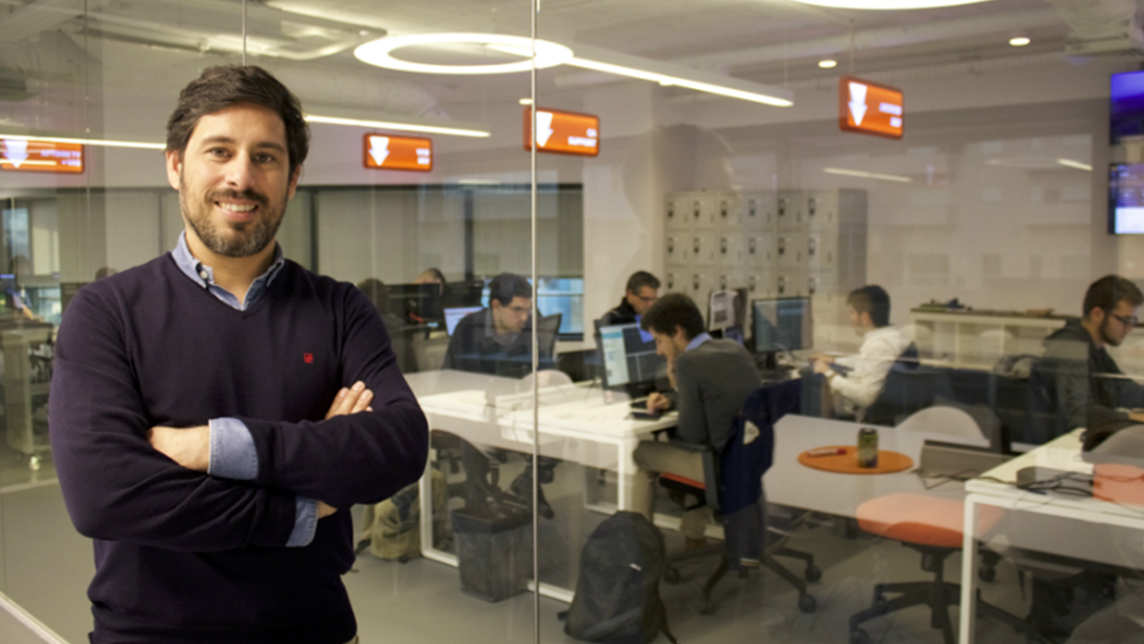Two billion devices worldwide are powered by Android. Yet most Android users get their apps from just one place: the Google Play Store. But why limit yourself?
Among the options out there is Aptoide. It does not just offer an alternative Android app store – but countless of them, in a single marketplace. And unlike some app platforms that choose the content they want to promote, Aptoide keeps itself open to various types of apps.
“Anyone can come to [our] platform and create [an app] store,” said Alvaro Pinto, co-founder and COO of Aptoide. “For example, if you want to have your own channel because you want to share the apps you like to use with your family and friends, you can.”
With countless apps competing for attention, should a developer want to get their app highlighted, they can place an advertisement within the Aptoide marketplace. Aptoide also provides the tools for app developers to monetize their products through in-app purchases and in-app billing.
Not their first rodeo
Pinto, 45, and his fellow co-founder and Aptoide CEO, Paulo Trezentos, are not new players in the industry.
Although he was trained in law, Pinto is an entrepreneur at heart. In the early days of the Internet, he started his first company, a software development agency, serving the B2B market. He later moved on to web and mobile applications.
In the summer of 2009, Pinto joined forces with Trezentos, another seasoned entrepreneur and co-founder of Caixa Mágica Software, to launch a software market for the open-source operating system, Linux. Realizing there was nothing similar in the mobile space, the pair took the Linux software marketplace concept and used it as the foundation for Aptoide.
The name Aptoide “is a fusion between APT-Get, from the Linux platform that inspired us, and Android,” Pinto explained in an interview via Skype.
Aptoide was so well received that in 2011, Pinto and Trezentos, both Portuguese, decided to incorporate the project.
From the get-go, Aptoide was open to an international pool of Android users and developers, and available in English, Spanish and Portuguese. Its popularity started in Southern Europe, mainly Spain and Italy, before it rapidly spread in Latin America.
Targets 1 billion users
Its openness is part of what makes the marketplace so charming, according to Aptoide’s community of users, developers and bloggers. Today, the marketplace has about 150 million users worldwide, 130 million monthly downloads and 40 languages supported. Brazil, Mexico and the US remain their largest markets, and the startup wants to reach 1 billion users by 2020.
Yet it has hardly spent money on promotion, calling itself a “community-driven platform”. Most of its growth has been through word of mouth on tech forums and blogs. That is starting to change though, as Aptoide is determined to tackle the fast-growing Asian market.
In Southeast Asia alone, there are 854 million mobile accounts and smartphone usage is expected to grow fivefold between 2013 and 2019. Figures released in 2015 show that more than 80% of smartphones in Indonesia, Malaysia and the Philippines run on Android, while in Thailand, Android has a 74% market share.
For some Asian markets, Aptoide has turned to paid endorsements with local influencers, “because sometimes it’s important to have local people talking in their native language about our platform”, Pinto said.
The hardware way
The company also has other means of acquiring users.
When you buy a new Android smartphone, there’s a chance that Aptoide has been preloaded or integrated into your device in some form.
Aptoide partners with original equipment manufacturers (OEMs) throughout the world to increase its visibility and accessibility among Android users. For example, Aptoide is integrated with Xiaomi’s Mi Picks and preloaded in some China-manufactured Android TVs.
Still, despite having Chinese partners, Aptoide doesn’t count China as one of its more successful markets.
With Google Play not available in China, “there are many, many different app stores emerging there – local app stores,” said Pinto. “We are available there but due to the fierce competition, we are not popular in China on the B2C side.”
In India, the platform is integrated with IndusOS, a homegrown Android-based operating system that supports the local languages. It is also in the midst of finalizing several partnerships in Indonesia, its biggest target market in Southeast Asia.
The Philippines and Malaysia are also on Aptoide’s horizon. Pinto and his team are careful not to look at Southeast Asia as a single market, hence providing customized solutions for the different problems arising in the various countries. Like China, each country has its own limitations when it comes to the type of content that can be circulated, whether because of legal restrictions or varying demand. The Aptoide marketplace is therefore adapted slightly from country to country: some foreign apps are filtered out, some local apps are added in.
“This is why partners are important,” said Pinto. “Local partners understand the market. They know which apps are restricted... [They] help us to filter the content.”
In 2015, Aptoide set up an office in Singapore to be closer to its regional partners, and soon secured a Series A investment of US$4 million from Southeast Asia-based Gobi Partners and Golden Gate Ventures. Since then, the team has not raised further funding, but they are not in a rush. For now, they are focused on improving their product and addressing growth.
“We have not started talking with investors for a Series B,” Pinto said, adding that the company wants to tackle the “challenges” in its different markets and business model first.
“Series B is about scaling up,” he said. “We have a relevant user base but to scale up, the money we get through advertising is not sufficient. We want to move faster and that’s where a Series B would make sense for us.”













